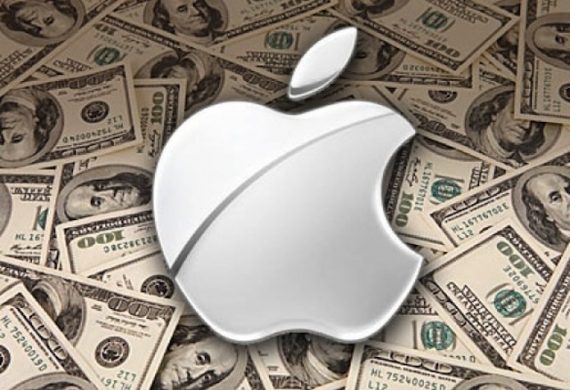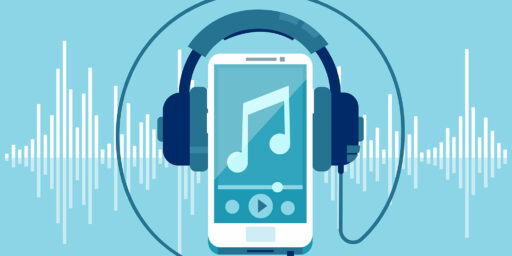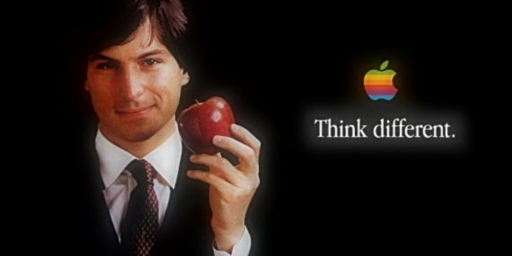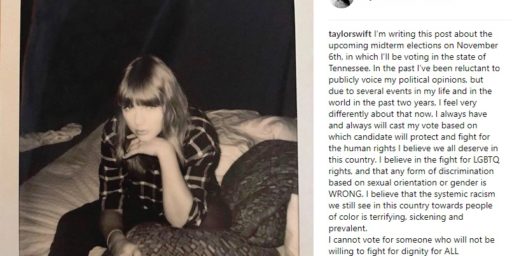Apple Reverses Course On Music Royalties
Well, that didn't take long.
Well, that didn’t take very long. Less than twenty-four hours after it became the target of one of the biggest names in entertainment, Apple has announced that it is reversing course and will pay royalties to artists and other rights holders during the free trial period for its new music service:
When Taylor Swift speaks, even the most powerful company in the world listens.
Less than 24 hours after Ms. Swift complained publicly that Apple was not planning to pay royalties during a three-month trial period of its new streaming music service, the company changed course, and confirmed that it will pay its full royalty rates for music during the free trial.
“When I woke up this morning and read Taylor’s note, it really solidified that we need to make a change,” Eddy Cue, Apple’s senior vice president of Internet software and services, said in an interview late Sunday.
In a letter posted Sunday morning to her Tumblr page, called “To Apple, Love Taylor,” Ms. Swift addressed a situation that had begun to send shock waves through the music industry: Apple, which has announced a subscription streaming service to compete with Spotify, Rhapsody and Deezer, was not going to pay royalties during the trial period.
Ms. Swift, who last year pulled her music from Spotify in another dispute over royalties, called Apple’s policy “shocking, disappointing and completely unlike this historically progressive company.”
“We don’t ask you for free iPhones,” she added. “Please don’t ask us to provide you with our music for no compensation.”
Ms. Swift had framed her letter as an explanation for why she was withholding her latest album, “1989,” from Apple’s new service. But she said that she was also speaking for other musicians who were afraid to speak up about the issue, and her comments found wide support in the music world. On Twitter, Elvis Costello called Ms. Swift’s note “a note from our future President.”
Apple’s arrival in streaming music has been much anticipated by the music industry, but its plan not to pay royalties during its trial period drew complaints from independent music groups around the world, saying that the company’s terms were unfair.
But the criticism from Ms. Swift — perhaps the biggest star in pop today — was a damaging public-relations misstep for Apple on the eve of its big new product release.
Mr. Cue, the Apple executive in charge of iTunes and Apple’s new music service, said that he had spoken to Ms. Swift on Sunday. “I did let her know that we heard her concerns and made the change,” he said.
Early Monday, after Apple’s change was announced, Ms. Swift tweeted: “I am elated and relieved. Thank you for your words of support today. They listened to us.”
Mr. Cue said the company’s original plan was to pay a slightly higher royalty rate — at least 71.5 percent of the money it collects from sales, as opposed to the industry standard of about 70 percent — in exchange for the free trial.
But many record executives, particularly at small labels where margins are thin, had described a frightening scenario in which income from important new albums that came out during the free period would not only lose out on crucial download income, but also get nothing from Apple’s new streaming feature.
Mr. Cue said that Apple will now pay royalties to both record companies and music publishers for the use of music during the trial period. He declined to specify how much money that might cost the company, which is the biggest retailer of music.
Swift’s Tumblr post had reportedly received record traffic yesterday notwithstanding the fact that it was a Sunday, and the story was picked up by pretty much every major news outlet. So, one assumes that Apple was getting a lot of negative feedback on this, and it’s likely that one artist going public would’ve led others to do the same. So, this was a smart business decision on Apple’s decision as well as being the right thing to do for the reasons I explained yesterday. As for the what this will cost Apple to pay royalties while not earning revenue from Apple Music, the company obviously has enough cash on hand to cover that and it seems clear that they stood to lose more from sticking to the “no royalties” position in the long run. For example, it’s likely that Swift putting her considerable star power into the debate on the side of the artists would have led other big names to join in and withhold their own music from the service. That, in turn, would have reduced the appeal that Apple Music had to subscribers, especially since they can get much of the same content on services that they don’t have to pay for such as Spotify. Apple is already taking something of a risk in making its service subscription-only, so anything that makes the service less appealing to users could be a potential problem. And, there’s nothing that would make a service like this less appealing to consumers than the idea that the music they want to listen to isn’t available at all. This will cost Apple something in the short-term, but it’s the smart move in the long term.
So, I guess we score this one Taylor Swift 1 Apple 0.
The interesting thing will be how this impacts the future battles over compensation for compensation for streaming music that are inevitable at this point. There are still complaints about the relatively low compensations rates that Spotify and others services pay rights holders. That’s one of the reasons that, at least initially, Apple was making fans in the music industry with its announcements that it would pay higher averages than most other streaming services, a announcement which made the “no royalties” policy just plain confusing. When you’re obviously structuring your payments in a way to please your content providers, why adopt a policy that’s only going to anger them? It made no sense, which is no doubt why it was so quickly abandoned.







@Doug Mataconis:
Anyone in the music industry thinking that Apple is their friend really should have their heads examined.
My math in the previous thread was quite bad.
That would be a 1.5 point increase or about 2.14%. Which means that it would take 11 2/3 years for this deal to pay more than a deal with no free trial and the industry standard 70%.
I really hope that Taylor Swift will address why an extra 2.14% makes what Apple is going to pay her acceptable, but not what Spotify pays… Unless the record companies are going to pay more of their share to the musicians/composers/etc, nothing has changed. Apple may create more subscribers, but the pay per stream will not magically rise…
See, Apple listens
-so long as you give them a kick in the behind first:-).
I agree with Doug that the debate is not over. They have to find a way to pay musicians better. The Gen X presumption that composers in particular and musicians in general should just work for free isn’t sustainable.
Here’s a very good reponse to the Albini rant in the Guardian that James Pearce referenced in the comment thread to Doug’s earlier post:
Two quotes popped out at me.
First from Doug:
Then this from the quoted article:
The recorded music business is so dried up that the “biggest retailer of music” has to basically give away the store (90 day free trial, operating at a loss) in order to build a subscriber base for what should be a listener’s paradise. (20 years ago if someone offered me thousands of albums for the price of 12 albums a year, I would have accepted it. Anyone would. Nowadays…it’s a hard sell.)
@stonetools: Thanks for posting that response. Where’d it come from?
The touring stuff I’m not unsympathetic to. Not all artists can tour, or want to. Live performances may not be in the cards. What I don’t understand, though, is why these artists think they’re entitled to make money if they don’t do the things that make money? I’m not saying they shouldn’t be paid for any of their recordings. Of course they should.
I’m saying that the market for their recordings is drying up, that they won’t make much money at it, and the rock star money will be made by people performing for it.
(Frankly, the slippery slope stuff for other industries was easy for me to reject. TV, movies, books, video games have all struggled in the internet economy. But the pros are figuring it out, and the amateurs have never had it better.)
But is it really? People will still pay for music they love (and do). The change to being able to buy individual songs instead of complete albums really hasn’t cut into song revenues because people are buying a ton of individual songs (at least a lot are, just ask Apple).
And there’s revenue to be made from the streaming model ESPECIALLY for up and coming artists. When Spotify decides, based on your past listening, that you would like to hear a song from an artist you’ve never heard of that artist still gets paid.
@James Pearce:
It came from the comment thread to the article you referenced.
The point is that if the artists cannot make money from things they can do (composing, session work), then they won’t make music, period. They’ll do something else, like sell insurance.Or maybe they will follow in the footsteps of a well known musician who made a very successful living writing commercial jingles,(where you don’t have to worry about piracy or selling to the consumer) then struck out on his own and made a lot of money touring. Remembr Barry Manilow?
@Davebo:
Yes.
Not dead yet….but drying up. Check this out.
There’s a lot of red triangles on that chart. From 1999 to 2011, the “US Shipment Value” has plummeted 52%.
And this:
Here’s more recent numbers from a piece in Variety:
Album sales have been declining like this for a decade now.
Rolling Stone:
Digital isn’t picking up the slack:
Streaming, on the other hand, experienced some growth:
People aren’t buying much music anymore. They’re streaming it.
Which brings us back to the problem of “how to make money in streaming.”
@stonetools:
Sure, but that’s always been true. How many gifted artists didn’t “make it” because they didn’t get a record deal?
Now “making it” means making the record.
Apple was Steve Jobs and since he has made his trip into the either of the the universe I don’t really see anything coming out of the company.
@James Pearce: I just bought a bunch of expensive European CDs this last week but I know I’m an old fart when it comes to technology.
(And yeah, Zdzislawa Donat is as fantastic a singer as I remember. Look for her singing the Queen of the Night arias from Die Zauberflote on YouTube.)
Also would like to give a big shout-out to YouTube. For those of us into opera there seems to be a wonderful population of devotees who have scrounged out some of the best (and obscure) performances around. Especially some of the great Russian singers who rarely traveled outside the Iron Curtain, or traveled only to non-European/non-US countries.
@grumpy realist: I have home WiFi and stream movies but when it comes to music I still prefer CDs.
@James Pearce: “(20 years ago if someone offered me thousands of albums for the price of 12 albums a year, I would have accepted it. Anyone would. Nowadays…it’s a hard sell.)”
But that’s in large measure because there are already other companies that do the same thing. I have yet to see any explanation of how Apple’s service is going to be any better than Spotify.
@James Pearce: What I don’t understand, though, is why these artists think they’re entitled to make money if they don’t do the things that make money?
Why are you entitled to listen to music without paying for it?
Mike
@wr:
I’m not really in the Apple ecosystem so I have no idea how it would be “better.” I’m guessing it’ll probably be easier to use…for people in the Apple ecosystem.
@MBunge:
I really failed if you thought that’s what I’m arguing for. Yes, when you say the record business is falling apart, that just means you want to be a pirate.
At any rate, here’s Steve Albini again on that particular concept:
Go ahead….laugh, but those are my rates. Every time I hear Turn Down for What, Lil Jon has to pay me $100. Oh, he’s not going to pay?
Then he’s a thief.
Here’s the truth: You don’t pay for music you listen to. You pay for music you want to control.
@James Pearce: Here’s the truth: You don’t pay for music you listen to. You pay for music you want to control.
Which is exactly the sort of content free statement which demonstrates that, yes, this really is all about you not wanting to pay for someone else’s work.
The music you have been listening to for your entire life has always been paid for. Not always by you, of course. Sometimes other people paid for it. What’s happening is that technology is eliminating those other people. Which wouldn’t be a problem if people like you were willing to now pay your fair share or at least accept that you won’t listen to music you don’t pay for.
Except you’re pretty clear that you think someone else should still pay for the music you listen to and, anti-record company posturing aside, you’ve decided that someone else should be the musicians themselves.
Mike
@MBunge:
Well, Mike, no offense, but you don’t know anything about how many concerts I go to, or how many albums I buy or from who. You’ve mistaken a clear-eyed view of the record-selling business for an endorsement of piracy.
Then you say things like: “What’s happening is that technology is eliminating those other people.”
No, technology isn’t eliminating people. It’s eliminating inefficiencies. It’s diversifying the market. It’s creating an environment where “commercial appeal” isn’t the only appeal. But that’s not important. What’s important is “if people like you were willing to now pay your fair share.”
But what’s my fair share? I buy albums and concert tickets. Is it unfair that Roger Waters and David Gilmour get nothing when I listen to Dark Side of the Moon for the 50th time? No, I paid for it. A couple times. (The remaster is great.)